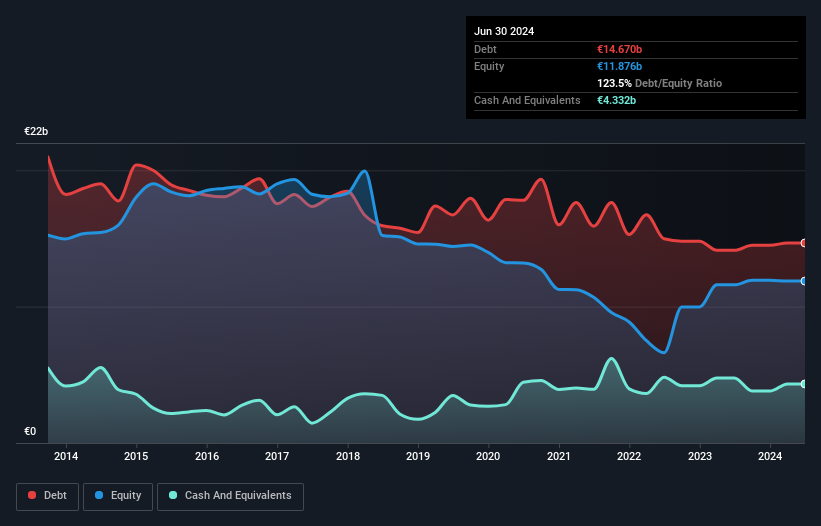
Legendary fund manager Li Lu (who Charlie Munger backed) once said, 'The biggest investment risk is not the volatility of prices, but whether you will suffer a permanent loss of capital.' So it seems the smart money knows that debt - which is usually involved in bankruptcies - is a very important factor, when you assess how risky a company is. We can see that Naturgy Energy Group, S.A. (BME:NTGY) does use debt in its business. But the real question is whether this debt is making the company risky.
Why Does Debt Bring Risk?
Debt is a tool to help businesses grow, but if a business is incapable of paying off its lenders, then it exists at their mercy. Part and parcel of capitalism is the process of 'creative destruction' where failed businesses are mercilessly liquidated by their bankers. However, a more frequent (but still costly) occurrence is where a company must issue shares at bargain-basement prices, permanently diluting shareholders, just to shore up its balance sheet. Of course, debt can be an important tool in businesses, particularly capital heavy businesses. The first thing to do when considering how much debt a business uses is to look at its cash and debt together.
View our latest analysis for Naturgy Energy Group
What Is Naturgy Energy Group's Debt?
As you can see below, Naturgy Energy Group had €14.7b of debt, at June 2024, which is about the same as the year before. You can click the chart for greater detail. However, it also had €4.33b in cash, and so its net debt is €10.3b.

A Look At Naturgy Energy Group's Liabilities
Zooming in on the latest balance sheet data, we can see that Naturgy Energy Group had liabilities of €6.74b due within 12 months and liabilities of €19.2b due beyond that. Offsetting these obligations, it had cash of €4.33b as well as receivables valued at €3.00b due within 12 months. So its liabilities total €18.6b more than the combination of its cash and short-term receivables.
This is a mountain of leverage even relative to its gargantuan market capitalization of €21.3b. Should its lenders demand that it shore up the balance sheet, shareholders would likely face severe dilution.
In order to size up a company's debt relative to its earnings, we calculate its net debt divided by its earnings before interest, tax, depreciation, and amortization (EBITDA) and its earnings before interest and tax (EBIT) divided by its interest expense (its interest cover). Thus we consider debt relative to earnings both with and without depreciation and amortization expenses.
With a debt to EBITDA ratio of 2.0, Naturgy Energy Group uses debt artfully but responsibly. And the alluring interest cover (EBIT of 7.7 times interest expense) certainly does not do anything to dispel this impression. Sadly, Naturgy Energy Group's EBIT actually dropped 6.9% in the last year. If earnings continue on that decline then managing that debt will be difficult like delivering hot soup on a unicycle. The balance sheet is clearly the area to focus on when you are analysing debt. But it is future earnings, more than anything, that will determine Naturgy Energy Group's ability to maintain a healthy balance sheet going forward. So if you're focused on the future you can check out this free report showing analyst profit forecasts.
Finally, a business needs free cash flow to pay off debt; accounting profits just don't cut it. So it's worth checking how much of that EBIT is backed by free cash flow. Looking at the most recent three years, Naturgy Energy Group recorded free cash flow of 47% of its EBIT, which is weaker than we'd expect. That's not great, when it comes to paying down debt.
Our View
While Naturgy Energy Group's EBIT growth rate makes us cautious about it, its track record of staying on top of its total liabilities is no better. But its not so bad at covering its interest expense with its EBIT. We should also note that Gas Utilities industry companies like Naturgy Energy Group commonly do use debt without problems. Taking the abovementioned factors together we do think Naturgy Energy Group's debt poses some risks to the business. While that debt can boost returns, we think the company has enough leverage now. The balance sheet is clearly the area to focus on when you are analysing debt. But ultimately, every company can contain risks that exist outside of the balance sheet. Be aware that Naturgy Energy Group is showing 4 warning signs in our investment analysis , and 1 of those shouldn't be ignored...
If, after all that, you're more interested in a fast growing company with a rock-solid balance sheet, then check out our list of net cash growth stocks without delay.
If you're looking to trade Naturgy Energy Group, open an account with the lowest-cost platform trusted by professionals, Interactive Brokers.
With clients in over 200 countries and territories, and access to 160 markets, IBKR lets you trade stocks, options, futures, forex, bonds and funds from a single integrated account.
Enjoy no hidden fees, no account minimums, and FX conversion rates as low as 0.03%, far better than what most brokers offer.
Sponsored ContentValuation is complex, but we're here to simplify it.
Discover if Naturgy Energy Group might be undervalued or overvalued with our detailed analysis, featuring fair value estimates, potential risks, dividends, insider trades, and its financial condition.
Access Free AnalysisHave feedback on this article? Concerned about the content? Get in touch with us directly. Alternatively, email editorial-team (at) simplywallst.com.
This article by Simply Wall St is general in nature. We provide commentary based on historical data and analyst forecasts only using an unbiased methodology and our articles are not intended to be financial advice. It does not constitute a recommendation to buy or sell any stock, and does not take account of your objectives, or your financial situation. We aim to bring you long-term focused analysis driven by fundamental data. Note that our analysis may not factor in the latest price-sensitive company announcements or qualitative material. Simply Wall St has no position in any stocks mentioned.
About BME:NTGY
Naturgy Energy Group
Engages in the supply, liquefaction, regasification, transport, storage, distribution, and sale of gas.
Established dividend payer and fair value.


